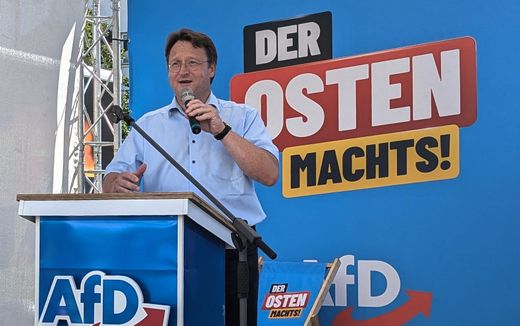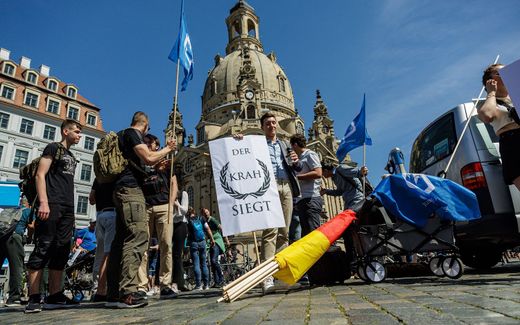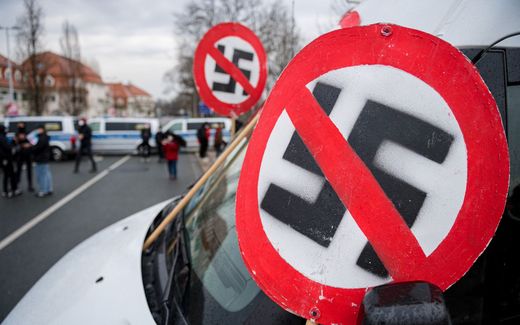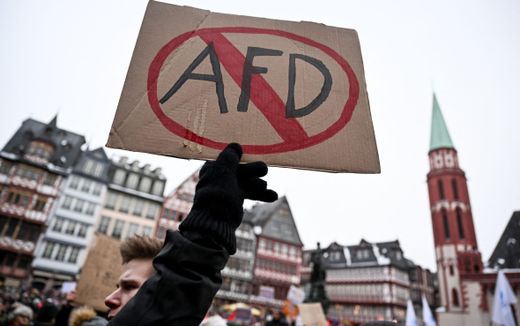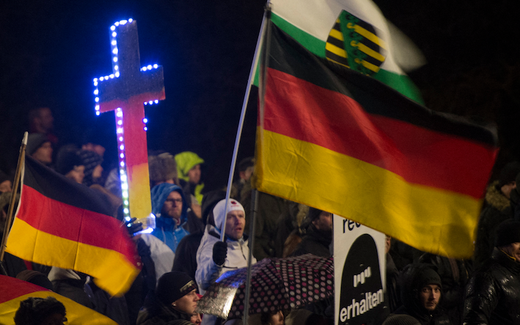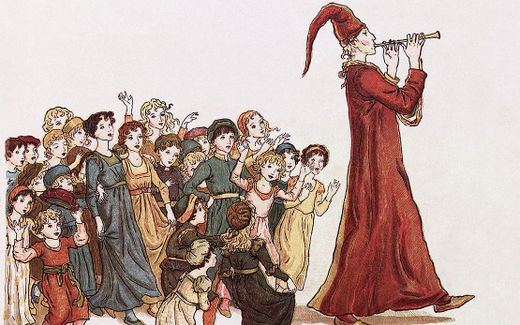Why many German voters miss inspiration among the traditional parties
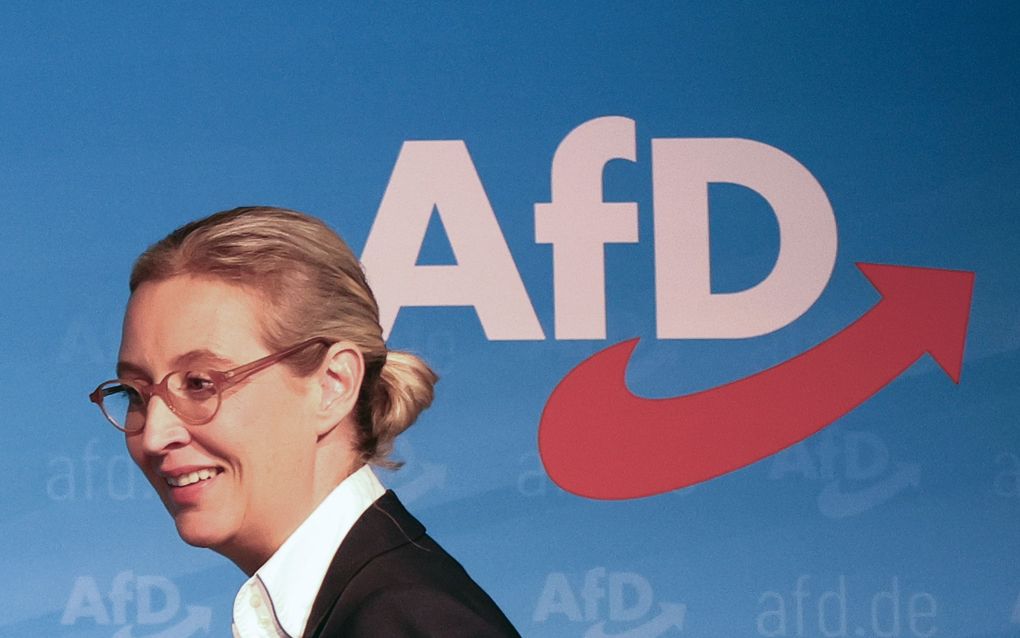
Alice Weidel, one of the AfD leaders in Germany, on Monday morning at a press conference. Photo EPA, Filip Singer
Central Europe
‘Bitter’, that’s what the German chancellor Olaf Scholz called the election results in the ‘Länder’ Saxony and Thuringia. And bitter they were for his SPD party, for his Traffic Light coalition and the CDU. What could be the appreciation of last weekend’s results from a Christian perspective?
The populist right-wing party Alternative für Deutschland (AfD) won in Thuringia with almost one-third (32.4 per cent) of the votes. The Christian Democrats (CDU) were second with less than a quarter of the votes (23.8 per cent). The Traffic Light Coalition (Social-Democrats, Liberals and Greens) scored slightly more than 10 per cent of the votes (SPD 6.2, FDP 1.2 and Bündnis90/Die Grünen 3.5 per cent). The Greens and the Liberals scored below the electoral threshold, meaning they will no longer be represented in the state parliament.
As all other parties exclude AfD from governing, the CDU will either have to form a government with SPD and the new kid on the block, Sahra Wagenknecht’s BSW. This is a party that identifies itself as progressive in economic affairs and culturally conservative. Another possibility would be to form a coalition of CDU and Die Linke. But so far, the Christian Democrats have refused to cooperate with Die Linke and BSW.
In Saxony, the results were slightly different, but the trend was comparable. Though the Christian Democrats won the elections (31.8 percent) and could continue their present coalition with SPD and the Greens, AfD, with more than 30 percent of the votes, came very close to winning the elections. Wagenknecht scored around 12 percent in Saxony, and almost 16 per cent in Thuringia.
Netherlands
This trend is similar to the shifts we saw during recent elections in the Netherlands and France. These countries also saw the rise of right-wing parties, which made it extremely difficult to create new coalitions — with or without the right-wing winners.
It is interesting to see how almost all analysts agree on the explanation for the dramatic shift in Germany. To give just one example of this consensus, the social scientist Raj Kollmorgen (Hochschule Zittau/Görlitz in Saxony) explains the radical-right successes among others by pointing to the recent history of the states of Saxony and Thuringia in the East of Germany, formerly part of the GDR.
Many citizens in these Eastern states have had bad experiences during the German transformation and reunification. Economic insecurity and social worries resulting from immigration and the influence of Islam have made them feel rejected, neglected, and even expropriated. Many of them have concluded that their problems are not due to mistakes by individual politicians but by the political system as such.
This critique of the political elite is twice as high in Eastern Germany as in the Western states. And their recent history (including the Wende) has also taught the people of the eastern regions that their protest against a political system may lead to regime change.
Adolf Hitler
The appreciation of this German landslide depends on someone’s political position. “For the first time in post-war Germany, an extreme-right party has become the largest faction in a parliament”, a German newspaper wrote.

The comparison with the developments in the 1930s is easily made: Adolf Hitler’s NSDAP also came to power by winning democratic elections, and soon transformed the political system into a non-liberal, autocratic regime. That is what many people fear. Their spokesman is the German chancellor, who this weekend said that everything needs to be done to create new coalitions without radical, populist, non-constitutional, anti-immigration, pro-Russia parties like BSW and AfD.
However, not only members of the traditional parties show their chagrin. The churches do so as well. For Christians living in the eastern Länder (and Saxony is part of the German Bible Belt), a vote for a Christian party is not obvious. Many of them have voted either for BSW or AfD. And if they did, they did so in complete defiance of advice they had been given. AfD’s appreciation and re-interpretation of Christian values are criticised by the Protestant Church as well as the Catholic Church as blasphemy.
Despite this piece of advice, Christians who voted for AfD emphasise AfD’s conservative positions on social and cultural issues. Although many radical politicians may not be Christians, they still oppose abortion, the LGBT agenda and immigration. And by doing that, they attract some parts of the religious electorate.
Nihilism
The outrage of the churches seems rather selective in the first place. Why have they not declared other political parties with an explicitly non-Christian or even anti-Christian agenda not electable? And what seems more important, in the second place, is the absence of a convincing alternative for worried citizens, be they Christian or not.

The most lucid analysis of what went wrong in Germany in the 1930s is by the Jewish philosopher Leo Strauss. He argued that the vote for National-Socialistic Nihilism was not motivated by Nihilism on the part of the (young) voters but was ultimately inspired by the desire for a life that was not satisfied with the liberal perspective of equality and tolerance. What they looked for was a life of “blood, toil, tears and sweat", in Winston Churchill's words. But this desire was not met by any political party. Therefore, out of protest, they voted for a party that promised a break from the impotent democracy of the Weimar Republic.
That’s the same in the present. Purely material policies do not inspire voters; they seek hope, inspiration, and a higher perspective. If the traditional parties cannot offer that perspective, they go to other groups that oppose the politically correct system.
The German president's call for new and robust measures against immigration after the attack in Solingen and just a few days before the elections did not convince these voters. As long as a decent alternative to social liberalism and radical populism is delayed, a vote against the prevailing system seems a predictable case of the pundits’ own fault.
Related Articles


